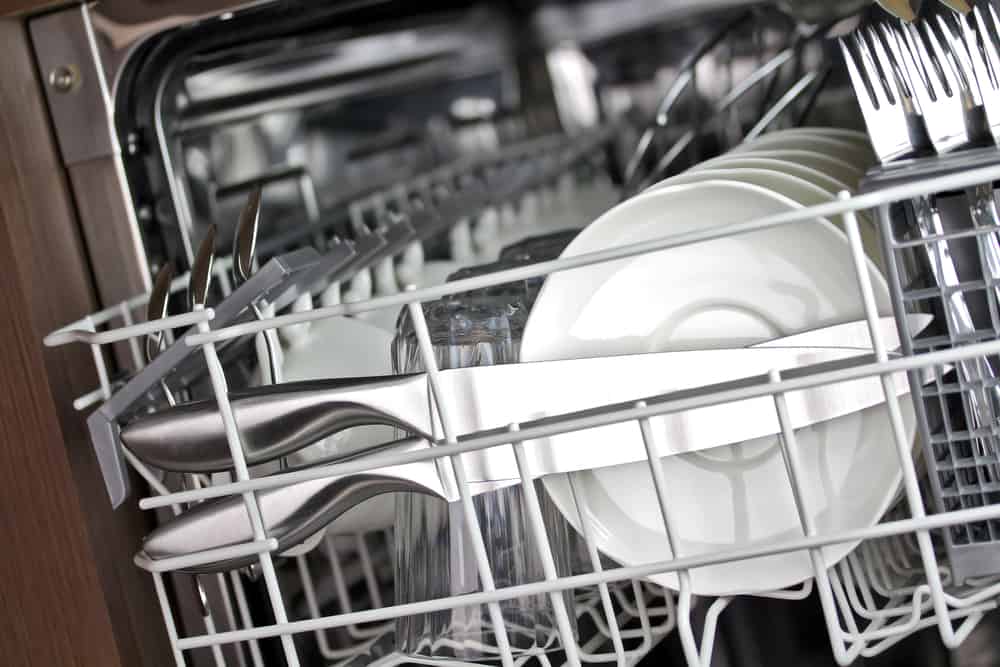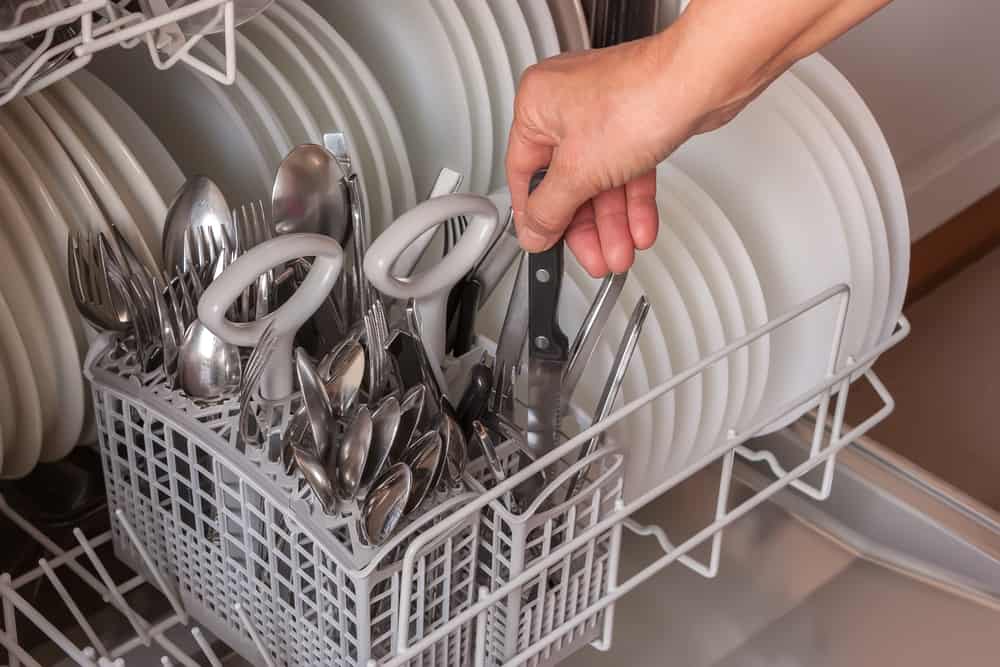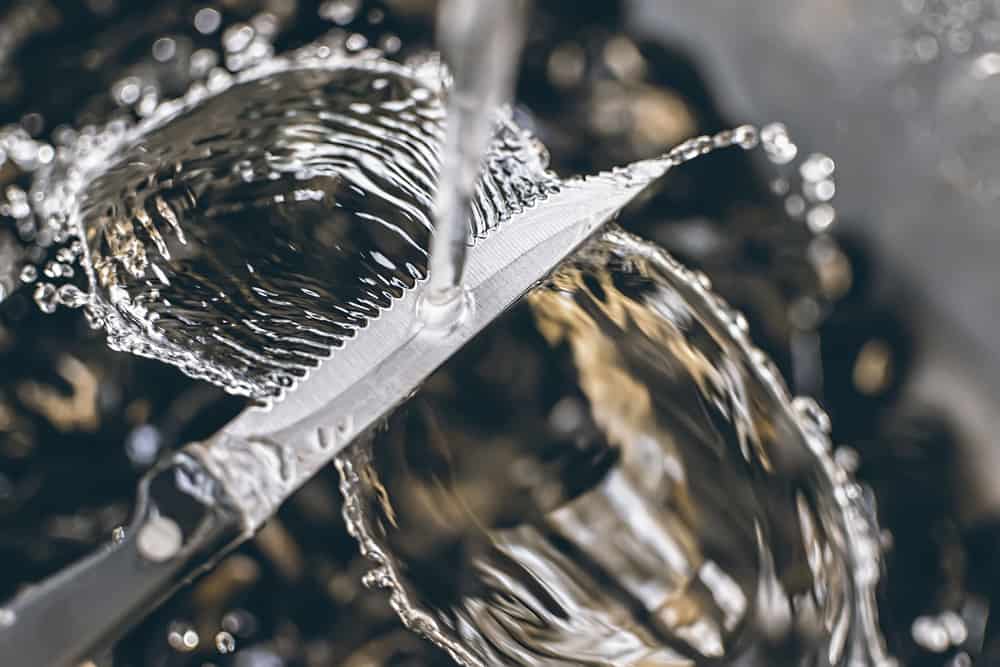Can knives go in the dishwasher? There are many kinds of kitchen knives, and it's so easy to throw them in the cutlery basket of your dishwasher with all the other utensils. But this is a bad idea, and there are many reasons not to.
Knives, especially high-quality chef knives, should not go in the dishwasher. A trip to the dishwasher can turn a sharp knife into a useless knife over time. In the dishwasher, knives can be damaged, blunted, or worn down much faster than they should be.

These Chef’s Knives Should Hever Have Been Placed in the Dishwasher
It may be hard to understand why you can't just toss your hard steel or ceramic knives in the dishwasher without issue. So to give you an idea of the damage a dishwasher can do to a kitchen knife, read about the harmful effects below.
Bad Things Happen When You Put Knives in the Dishwasher - as Demonstrated by A.G. Russel Knives
There are a few things that can damage and erode your knives. When you run sharp knives in the dishwasher, the blade and handle are in jeopardy.
Four main harmful things occur when you put your knives in the dishwasher.
Heat is an essential aspect of dishwashers doing their job. But the intense heat consistently placed on your knives can erode the blade and the handle.
While you can sometimes set your dishwasher to do a cold cycle, it can still be damaging to your knives due to water pressure. However, the heat of a dishwasher is one of the biggest reasons not to run your knives through the dishwasher.
People often don’t think about how much movement goes on in your dishwasher. But if you’ve ever found a beloved glass cracked at the end of a cycle, you may have some idea.
Dishwashers use powerful sprays to eliminate food remnants and ensure everything comes out clean. But when these harsh sprays hit your knives and other cutlery, they can bang together, causing dents in blades and wearing down the sharpness.

Putting a knife in the dishwasher like this can shorten the life of your knives
If you run your sharp knives through the dishwasher and do not take them out immediately when the cycle ends and hand dry them, they can slowly begin to rust and corrode. This act can be the difference between a knife that lasts years and a knife that lasts months.
Even if you don’t notice rust or corrosion, it can slowly wear down your knife. Both the blade and handle can be damaged if left in the dishwasher long after the cycle ends.
It may be hard to believe, but running knives through the dishwasher contributes to the slow disintegration of the blade. This is true even with stainless steel knives, despite some manufacturers advertising that they will never wear down or lose their sharpness.
When the harsh sprays and dishwasher detergent hit your chefs knives, it will abrade the blade, meaning your knives will need sharpening more often, and will not last as long.
Washing knives by hand is the best way to preserve them. Don’t soak them until you’re absolutely ready to start the cleaning process.
Soaking your knives can lead to a dull blade and rust or disintegration of the blade and the handle. Experts recommend giving the knife a quick rinse after using it, so food particles do not get stuck but leave it on the counter or the chopping board until you’re ready to clean it.

Want Your Knives to Last a Long Time and Stay Sharp? Wash Them by Hand
When the moment comes to clean it, you should wash your knife with hot water with mild dish soap. Make sure you use a soft sponge, not steel wool or a harsh scrubber. Make sure to clean the blade as well as the handle. Many people neglect to properly clean the handle, which can be a breeding ground for bacteria and bacteria transfers.
Once you have thoroughly cleaned the kitchen knife with dish soap and hot water, you should give it a thorough rinse in cold water. Leaving soap residue behind is bad for your health and can wear down the knife over time.
Another problem is that people often lay their knives on a dish towel or drying rack. Kitchen knives should be immediately hand-dried, as air drying can lead to a buildup of rust or stains.
Use a paper towel or dish towel to gently dry the knife, being careful not to cut yourself on the blade. It’s ideal to dry the knife with a soft cotton towel, but most rags and towels will be acceptable.
Caring for high-quality chef knives takes a bit of effort. But once you get into the proper habits, you’ll make your knives last longer and stay sharper, making your culinary adventures easier.
Below are three tips for caring for knives, which are the most common mistakes people make concerning premium chef knives.
As discussed, knives and other utensils clanging against one another are common causes of damage. It can blunt the knives, cause dents, and even chip ceramic knives. So don't store knives lose in a drawer with other knives and utensils.
Instead, use a butcher knife block to protect the blades or a magnetic knife strip where the knives will be secure and safe.
Another reason not to store knives in drawers is that they pose a safety hazard. If someone reaches into the drawer too quickly, they may cut themselves on the blade.
Keeping your knives sharp can make chopping food easier and also prevent accidents. Some people like to send their high-quality chef knives to professionals for sharpening. But a professional is not entirely necessary.
You can easily sharpen your blades at home using a honing appliance. Honing is different than sharpening, as it simply realigns the blade’s edge rather than removing any material from the knife. And you can hone your knives every time you use them, so you get a sharp and precise cut with every meal you make.
If you want to have your sharp knives cared for by a professional, you can send your knives to a pro once or twice a year, depending on how often you use them. But there are many affordable honing and sharpening tools you can order online to care for the knives yourself.
There are also helpful Youtube videos that can walk you through sharpening different knives properly, whether you use a ceramic knife, calphalon knives, or a Wusthof knife. Almost all kitchen knives need sharpening at some point.
Many people have a poor habit of using their knife blade to scrape chopped food off the cutting board and into a bowl or pot. But this is a huge mistake. Scraping the blade across the cutting board will quickly dull and damage the knife, making it less effective with every use.
Instead of using the sharp blade side to corral chopped ingredients, flip the knife over and use the flat, dull side. This way, you can still move the chopped food in one clean swipe without getting your hands dirty. But the knife won’t be damaged in the process. It may feel awkward at first, but try making a habit of flipping the knife over before scraping the cutting board.
Dishwashers are a lovely convenience that can make life much easier and keep your sink clean and empty. But not everything can go into the dishwasher. If you want your kitchen items to last and stay in good shape, ensure you know what can and cannot go in the dishwasher.
Antique and carefully decorated plates, cups, bowls, and other flatware should never go in the dishwasher. Even items with screen-printed images can quickly wear off under the heat and harsh sprays of the dishwasher.
Most plastic can go in the dishwasher. But thin plastic can melt and warp under heat. When in doubt, check the bottom for a dishwasher-safe label, or just hand wash plastic.
Cast iron, non-stick, and copper pots and pans should never go in the dishwasher. They can corrode, rust, and take damage, so you should always hand wash these items.
As mentioned, movement occurs in the dishwasher. So your delicate crystal and glassware should not go in the dishwasher. Thick glass, like mason jars and Pyrex, is typically safe. But wine glasses, crystal plates, and other thin and delicate glasses should never go in the dishwasher.
Wood can splinter, snap, erode, and get moldy when you run it through the humid environment of a dishwasher. All knives, including knives with wooden handles need to be washed by hand. Additionally, be sure to always hand wash wood utensils and bowls.
Silver cutlery and other items can tarnish and wear down in the dishwasher. Most people don’t use silver anymore, as stainless steel is the new norm. But if you do have silver, always hand wash it to keep it shiny and beautiful.
For more information on putting knives in the dishwasher, refer to the commonly asked questions below.
No! This notion is a myth and putting your stainless steel knife in the dishwasher will turn it into a dull knife. Your stainless steel forks or metal spoon will do just fine in the dishwasher because they don’t need to maintain a sharp edge. Any knife material can wear and become blunt due to the heat and strong detergent in a dishwasher.
Butter knives can go in the dishwasher. But other than that, any sharp knives you want to keep should be hand washed. Even though many people put their serrated steak knives in the dishwasher, you should not. A ceramic knife can hold up to heat and dishwasher detergent but these types of knives are extremely fragile and likely to crack, chip or even snap during a rough dishwasher cycle in close proximity to other utensils.
